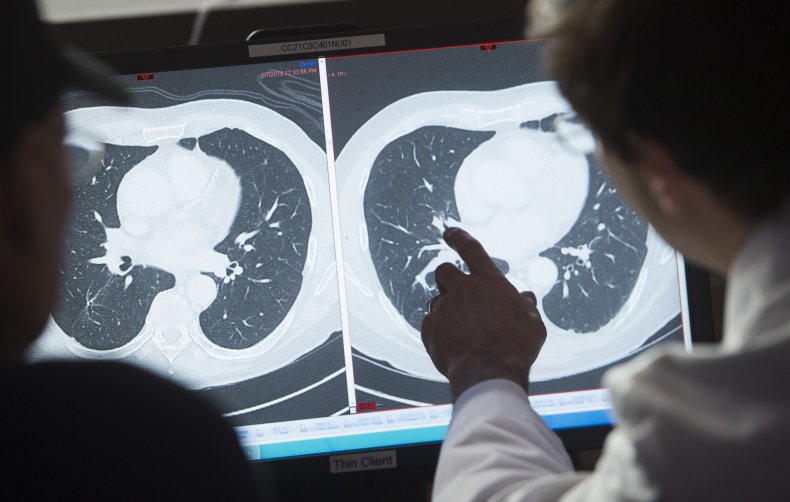COVID Pandemic Could Lead to Over 10,000 Cancer Deaths Due to Delayed Screenings
Millions of Americans missed out on key cancer screenings because of the coronavirus pandemic, potentially causing thousands of deaths in the next decade.
Patients delaying tests last year "may turn one public health crisis into many others," Ned Sharpless, director of the National Cancer Institute, wrote in the journal Science.
Sharpless said that because "elective" cancer surgeries and treatments have been reprioritized to save space for COVID-19 patients, cancers that were missed will be diagnosed at later, and potentially more acute, stages.
Colonoscopies, mammograms, lung scans and Pap tests were some of the top tests Americans missed, and researchers are studying whether tumors detected now are more severe. One study conducted by the University of Cincinnati suggests so. Researchers found that when CT scans checking for lung cancer resumed in June, 29 percent of patients had potentially cancerous nodules, versus 8 percent in years before.

For more reporting from the Associated Press, see below.
Screening tests differ in their risks and benefits, and health experts have long debated who should get which ones and how often. The pandemic lapse may serve as a "natural experiment" to see their value in modern times versus what's known from studies done long ago.
Any difference in deaths may not be seen for years, and early detection is only one factor in survival. Treatment also matters and it was hurt by pandemic delays too.
Based on what's known about breast cancer deaths from past years in the United States, about 10% "could have been prevented if women were getting routine screening," but 20% to 25% could have been prevented with appropriate treatment, said Dr. Otis Brawley, a Johns Hopkins University professor and former chief medical officer of the American Cancer Society.
"That's not to say screening is not important, but many people think that cancer screening saves more lives than it actually does," Brawley said.
A short-term delay may not hurt mortality much if screening resumes quickly, as it needs to do, he said.
Some reassuring news came at a recent American Association for Cancer Research conference from Sabine Siesling of the Netherlands Comprehensive Cancer Organization. That country offers women ages 50 to 74 a mammogram every two years but stopped in mid-March because of COVID-19. After it resumed in late summer, results "did not show any shift" to more advanced tumors, she reported.
Researchers from Massachusetts General and Brigham and Women's Hospital analyzed their screening tests for lung, cervical, colon, prostate and breast cancer. Screening dropped dramatically from March through June but the portion that found cancer or a precancer was higher than usual, suggesting that those who did get screened were at higher risk. When screening returned to near-normal from June to September, the number of potentially "missed" cancers was lower than expected.
When 43-year-old actor Chadwick Boseman died of colon cancer last summer, the Reverend Leroy Miles of Enon Tabernacle Baptist Church feared for the 12,000 members of his Philadelphia church. Black people are more likely to die of the disease than other groups, and there was limited access to colonoscopies, which can find and remove growths before they turn cancerous.
Miles, who has drawn more than 1,000 church members to other health events, called the University of Pennsylvania and said, "we know how to get people to come if you're willing and able to set something up."
Dr. Carmen Guerra had a federal grant to increase screening in racially diverse communities and realized that home tests could help. Studies show these tests, which look for blood in stool, help save lives. People put a tiny stool sample in a tube and mail it to a lab or, in this case, use a drop box at the church. If blood is found, the next step is colonoscopy.
Doctors passed out kits in the parking lot during a drive-thru flu shot event in October. Church members had to watch a video about colon cancer in advance and register to ensure they qualified for screening.
So far, 154 kits have been returned. Stacy Hill was among the 13 who tested positive. The 48-year-old Philadelphia woman had just lost her job and health insurance. Her colonoscopy revealed two growths that, like Abraham's, were caught before they turned cancerous.
"I was shocked," Hill said. "I'm a proactive-type person so I was glad to know."
The doctors also helped her enroll in Medicaid, "so now I have medical insurance" and can continue getting cancer screenings, she said.
The church hopes to offer the home tests again during blood pressure and diabetes screening events this spring.

